“Use Your Icicles”: A Review of This Time We Are Both by Clark Coolidge
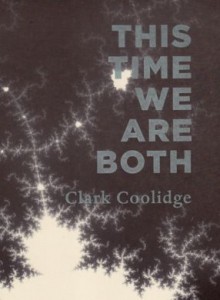 I. On January 13, 2011 a 6-year old boy was killed in downtown St. Petersburg by a giant icicle. This happened a block away from the apartment building where my grandmother used to live, two blocks away from the identical apartment building where my parents still live. The boy was an orphan, living with his grandparents. His grandmother was taking him to an outpatient clinic for a check-up after a recent cold. When he stepped outside his apartment building, the icicle became dislodged from the roof of the building and cracked the boy’s head. His grandmother, emerging from the building directly behind him, collapsed with a heart attack.
I. On January 13, 2011 a 6-year old boy was killed in downtown St. Petersburg by a giant icicle. This happened a block away from the apartment building where my grandmother used to live, two blocks away from the identical apartment building where my parents still live. The boy was an orphan, living with his grandparents. His grandmother was taking him to an outpatient clinic for a check-up after a recent cold. When he stepped outside his apartment building, the icicle became dislodged from the roof of the building and cracked the boy’s head. His grandmother, emerging from the building directly behind him, collapsed with a heart attack.
The next day, the press was astir trying to establish the party responsible for this incident. Who was to blame: the building, the block, the district, or the city administration? For a city located at the latitude of 60°N, St. Petersburg has been criminally poorly prepared for snow. Snow somehow always comes as a surprise in St. Petersburg. A few days after the death of the boy, as a bomb exploded in Moscow’s airport, St. Petersburg had another snow-related disaster: the roof of a mega-market “O’Key” caved in under a giant pile of snow. One person died and seventeen were injured.
Counter to its reputation, St. Petersburg doesn’t enjoy long, cold “Russian” winters. Instead, the flashes of cold weather alternate with periods of thaw, when snow melts forming ice on the ground and ice on the roofs of the buildings, from which snow has not been cleaned off. The last two years saw unusually high levels of snowfall—and the icicles have also grown to massive proportions. Theoretically, cleaning the roofs of the apartment buildings is a daily job. Practically, who is going to pay for it? And where to find workers willing to do the job? Money in the city’s budget allocated toward infrastructure needs has a tendency to mysteriously dematerialize. In the aftermath of the recent deaths, St. Petersburg’s governor Valentina Matvienko has proposed using the homeless as the workforce to clean the snow, and also developing laser technology to get rid of the snow “scientifically.”
II. The news of St. Petersburg’s latest battles with snow gather in my inbox as I’m in the middle of reading and rereading Clark Coolidge’s book-length poem This Time We Are Both, published in 2010 by Ugly Duckling Presse. The title is the first thing that grabs my attention. READ MORE >
February 18th, 2011 / 1:25 pm
Mark Twain’s Biography Told by a Selection from the Index in His Autobiography (UC Press, 2010)

Adventures of Huckleberry Finn, money earned from, 372, 597
The Adventures of Tom Sawyer, McDougal’s cave, 397
Albert Edward, Prince of Wales, 116, 499
Alexander VI (pope), 623
Alexander the Great, 465, 476
Alonzo Child (steamboat), 614
Animals: cat given Pain-Killer, 52, 351-52, 588; Clemens family cats, 345; compared to humans, 186-87, 218-220, 312
Belgium, 581
Bermuda, 479, 654
Bonaparte, Catherine, Princess, 540
Bonaparte, Napoleon, 172, 465, 500, 507, 540, 550
Caesar, Julius, 465, 467
Casanova, Giovanni Giacomo, 5, 6, 15
Charles I (king of England), 204, 526, 528
Charles II (king of England( 526
Cincinnati, Ohio, 461, 559, 646, 651
Clemens, Clara Langdon (Bay): death of mother, 25
Clemens, Jane Lampton: facility with words, 212; on SLC’s [Mark Twain] drinking and swearing, 215-16, 268, slaves owned and hired, 212, 471, 528; love of animals, 199.
Clemens, John Marshal: undemonstrative nature, 274, 321
Clemens: infant habits, 363
Clemens, Orion: middle-of-night visit to young lady, 52, 454
Clemens, Samuel Langhorne (Mark Twain): Freemasonry, 651; seventieth birthday dinner, 267-68, 305, 558, 657-61
ATTITUDES AND HABITS: dinner table behavior, 387-88; dueling, 294-98, 570-71; eating and drinking, 137, 210-12…; laziness, 305, 391; lying, 5, 268-69, 277, 425, 630; Presbyterian conncience, 157-59…; sleeping, 659-60; writing speed, 8, 228; CHILDHOOD: left behind by family, 209, 379, 530; sweethearts, 417-18
Colt’s Patent Fire-Arms Manufacturing Company, 101, 481, 494, 560
Doctors: Olivia Clemens’s experience as a teenage invalid, 356, 590-91
Drinking: anecdote about Episcopal sextons, 398-99; anecdote about drunken sutler, 290-91
France: SLC’s [Mark Twain] burlesque map of Paris, 362-63, 593. See also Joan of Arc
German language: compound word, 118-19; German nursemaid who uses profanity (Elise), 394, 607
Grant, Ulysses S.: similarity to Jervis Langdon, 373, 598; spiritual advisor, 99-100
Hannibal, Mo. Cave near, 213-14, 481-19, child left behind during move, 209, 379, 530, 600; cholera and measles epidemics, 52, 352, 420-21, 589, 628; tragedies that SLC [Mark Twain] witnessed as a child, 157-159, 514-15, 610
Howels, William Dean: SLC’s letters to, about “old pigeon-holed things,” 13, 30
Insurance company scandal, 257, 268, 271, 364-66, 464, 549
Langdon, Charles Jarvis: wagon incident, 357-58
Leopold II (king of Belgium), 268, 557
Life on the Mississippi: prototype of Huck’s father, 531-32; tramp’s death, 157-58, 514
Munro, David A., 564; as editor of North American Review, 47, 54, 54n102, 672, as Players club member, 284-85, 432, 547, 548
Nevada Territory: dueling in, 294-98, 568-70, SLC as miner, 445, 447, 543, 553, 641, 651
New Orleans: SLC seeks ship for South America, 561
Nicholas I (tzar of Russia), 540
Nicholas II (tsar of Russia), 550
Religion: Catholic funerals, 293-94; SLC’s [Mark Twain] Presbyterian conscience, 157-59, 188, 190, 398, 514; Susy Clemens’s “What is it all for?” question, 326, 375, 419, 580
“Roughing It” lecture, 508
Slavery: woman who saves SLC from drowning, 401, 613
Twichell, Joseph H: advice fro anxious suitor, 414-16; anecdote of hair restorer, 289; encounter with profane ostler, 8; witnesses execution of Civil War deserters, 430-31, 632-33
Victoria (Queen of England), 115-16, 126, 499, 501, 527
Whitmore, Franklin Gray, 316, 496, 621; spoon-shaped drive incident, 342-43, 587
Wuthering Heights (servant), 120-24, 500
***
Ben Shattuck is a writer and editor living in San Francisco. He contributes to The Daily Rumpus and interns at McSweeney’s.
February 9th, 2011 / 1:39 pm
NON-CHRONOLICALLY LIVEBLOGGING AWP 2011 FROM THE PERSPECTIVE OF A SOCIALLY-ALIENATED COUPLE (ALTERNATING SENTENCES, BEGINNING WITH MEGAN BOYLE, THEN TAO LIN)
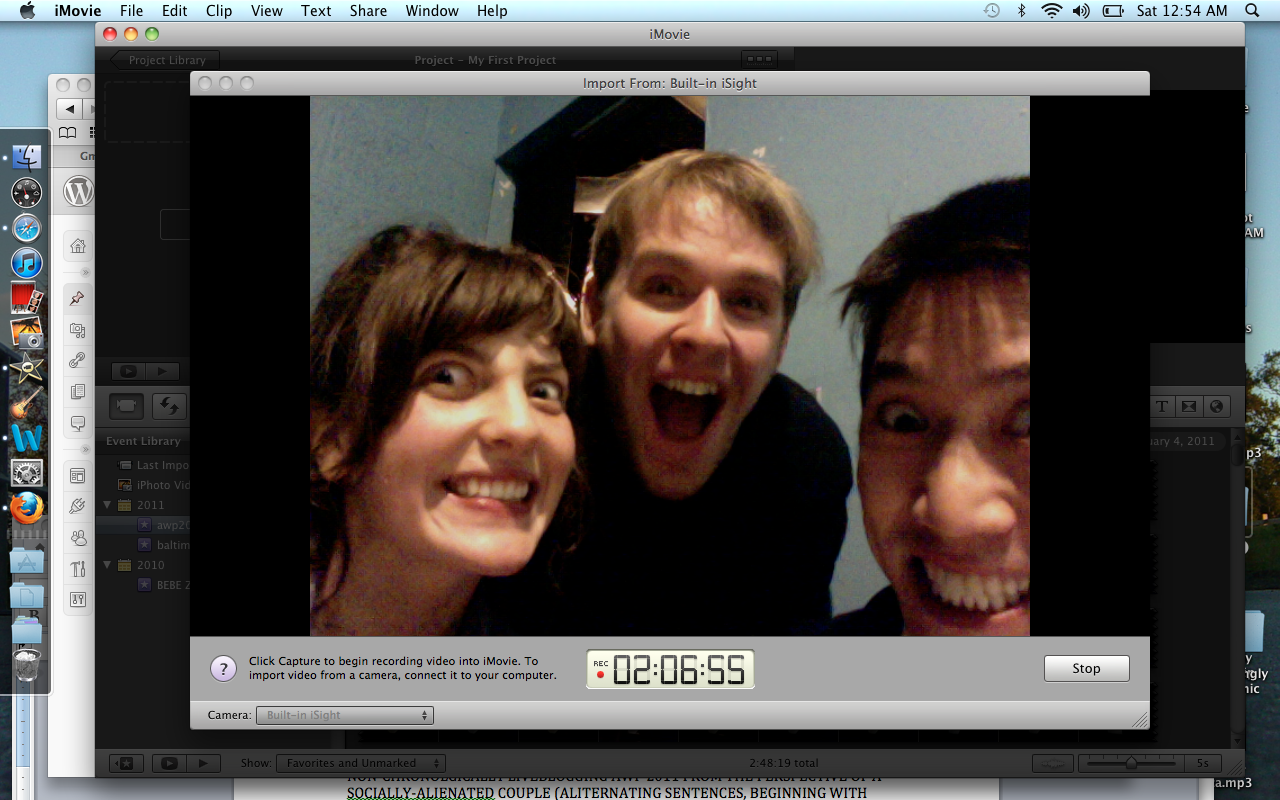
Pointed Tao in the direction of large group of people standing by the “correct” entrance of building.
Talked to Clay Banes in entrance, said something like “he’s distributing your book” to Megan.
While waiting for Tao to poop, looked into crowd of people and tried to discern the most acceptable way to hold MacBook.
Walked past an acquaintance while saying things like “hey” and “this is Megan” in a moderately-loud—for being in a bar—voice.
After writing “BRB” on newly abandoned promotional packet, approached bar to use “free drink” coupon for sparkling water, saw a girl I knew in college and said to Tao, “I know her from high school.”
Felt someone tap my shoulder and turned, vaguely aware of some girls that I don’t know talking to Megan, to hear something like “Jesus, hey, it’s Jesus, I—“
Saw 4 people moving “BRB” packet and looking confusedly at each other.
Said the word “chapbook” 8 – 15 times while looking nonspecifically at the crowd and sometimes hugging Megan.
Adam Robinson sat down on table thing next to us and said “So, you guys are married?”
Walked into a room in which Blake Butler and Gene Morgan and Gene Morgan’s wife, Jenny, seemed to be “chilling,” sat opposite Jenny.
Felt vaguely aware that people knew my name and had thought things about me, maybe, when Tao said, “This is Megan”
Heard someone say “can I say your ‘pizza’ tattoo” for third or fourth time about Megan’s lower-lip tattoo that says “pizza.”
Realized mid-conversation with Jenny that I had no idea how we started talking about Santa Claus.
Heard someone say “eight hours” in reference to snorting ecstasy.
Heard Tao impatiently say, “Oh it’s you again?!” and “You can’t type, are you okay?”
The room “erupted” in people saying “Andrew” with the “rew” part sustained at a high volume.
Thought the room became really quiet when I said “Andrew,” walked to hug him, and felt awareness that the back of my ass was maybe damp or something.
Saw someone I thought might be someone else, waved at them, said “Oh” loudly, then sort of beckoned for Megan to block that person’s view of me.
Timothy Willis Sanders and Andrew Weatherhead are wearing the same hat.
Said “that’s good, that’s funny, that’s the kind of detail people wanted to hear” to Megan, sitting to my left, as we both sort of stared either at the MacBook screen or, beyond that, at Andrew Weatherhead and Timothy Willis Sanders, seated on separate sofas, talking to each other.
Tao said to Adam Robison, “She got in a car accident” and pointed to my head and Adam said, “Car accident?”
Pointed vaguely at two people dancing on a stage, the only two people on the stage, and looked at Megan with a neutral facial expression.
Shortly after Tao ‘flung’ open door to some kind of dance party room and started writing his sentence, said, “Oh I have a good one” and he yelled, “IT’S NOT CHRONALOGICAL”
Pointed vaguely at [previous sentence] and said “it seems mean” repeatedly.
Sort of hugged my head with right arm, then quickly put it down when I became aware of potential sweat stain.
Said “the Get Up Kids covered this” with unfocused eyes.
Saw dancing girl approach a drink next to Tao’s and my water bottle, sat erect, and tilted head with intention to “intimidate.”
Pulled MacBook away from Andrew Weatherhead while he typed “drrrrhtup” from behind the MacBook, his hands sort of determinedly dangling toward the keys.
Tao said, “You look sexy” and I said, “I want to have sex” as we started meandering/peeking into a room where there were a lot of jackets and a girl sitting.
Andrew Weatherhead said “that’s not liveblogging, it’s a Word document.”
Said, “You want to get in on the live blog” and Timothy Willis Sanders moved his head in front of computer and said “LIVEBLOGGGGGG” in a sort of Adam Sandler tone of voice.
Pointed at a comma in [previous sentence] and stared at Megan.
Started talking to someone whose face I recognized from Facebook.
Said “that was freeing?” in a medium-loud voice, to seemingly no response, while within hearing range, I felt, of six people.
When it was my turn to write a sentence, realized Michael Kimball, Melissa Broder, Timothy Willis Sanders and Tao were staring at computer screen.
Felt strong, positive feelings toward Blake Butler as we seemed to stare non-awkwardly into each other’s eyes while saying things about Emory University.
Made eye contact with Lincoln Michel who said, “We’re talking about elephant urine,” to which I said, “Oh. Did you,” no one said anything for ~3 seconds and then heard him explaining something about elephants.
Heard someone say “Yerba ketchup.”
Said to Timothy Willis Sanders, “You went to a transvestite,” to the sentence I now know was “I went to a Chinese restaurant.”
Said “you spelled his name wrong and changed an ‘a’ to a ‘s.”’
Looked at ceiling, guess it’s painted black or something.
Said “seems apathetic.”
Stephanie Barber approached room out of breath and grinning and said between laughs/gasps, “That room, you have to go in that room” and looked at Melissa Broder and Michael Kimball sitting on couch.
Shook hands with Gene Morgan as he said “you guys having fun? yeah? it’s a party, a literature party.”
Tao said, “Where the hell are we” as we approached door with piece of paper that someone had typed “COFFEE POT!!!!!!!!!” on.
Saw someone who looked like Stephen Elliott but wasn’t.
Tao said “Any details?” while turning my body somewhat comedically to left and right and I saw an overweight black man ‘disappear’ into hallway near us.
Glam Lit: Eight questions from the Jaipur Literature Festival
The DSC Jaipur Literature Festival, held January 21-25 at the Diggi Palace in Jaipur, India, is the biggest literature festival in the Asia Pacific region and supposedly the biggest free literature festival in the world. I spent the festival investigating the new culture of literary glamour that has arrived in the subcontinent.
i. Do glamour and literature make good bedfellows, or should they stop hooking up?
Jaipur is a city on the edge of desert. It is a few-hour or half-day drive from New Delhi (depending on who you’re asking), which is India’s publishing and intellectual capital. I’ve never been to The Hamptons, but Jaipur feels like it could be an equivalent, except the white linen and Bentleys are exchanged for multicolored, mirror-work ethnic wear and camel carts. It is also the bastion of very old money, meaning the town is populated with the offspring of an 11th century clan of feudal rulers known as the Rajputs, who built hundreds of opulent palaces, most of which have been turned into tourist attractions or guest houses.
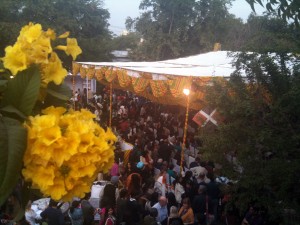
Scene from the balcony of the crowded Jaipur Literature Festival front lawns.
Hearing writers speak under grandly decorated tents at a Rajput mansion built in the 1860s gives all of the Jaipur Literature Festival’s events (even a panel named “The Return of Philosophy”) an inherently glamorous feel. Glamour is defined as “the quality of fascinating, alluring, or attracting, especially by a combination of charm and good looks,” and it is the preposition that makes me suspicious when it comes to the literary scene. But maybe, just two months in to a year of living in India, I’m just not used to it. Because in my experience, book events in America are held in convention center rooms under florescent lights, or in the children’s section of a bookstore set with uncomfortable folding chairs, or in the usual stronghold of American literary glamour: the grimy bar. READ MORE >
February 1st, 2011 / 10:56 am
SPIRALS ARE THE MOST CONSCIOUS SHAPES BECAUSE THEY OBSERVE THEMSELVES
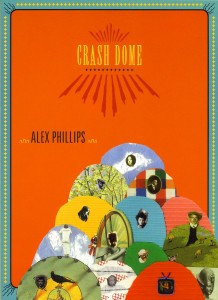 Factory Hollow Press and Alex Phillips have, for me, some specific experiential associations with the good writers of Massachusetts and the state itself, specifically the Factory Hollow Pond in Amherst. Because I don’t know anything else called Factory Hollow, I can say that these two entities alone—the collective responsible for creating Phillips’s book and the body of water in the general area where I was then poet-socialize-learning—created in me a rarely literal cognitive dissonance between language and place, seen and scene, a subject not implicit in Phillips’s debut book, but which tangentially gets built around its content, and rapidly.
Factory Hollow Press and Alex Phillips have, for me, some specific experiential associations with the good writers of Massachusetts and the state itself, specifically the Factory Hollow Pond in Amherst. Because I don’t know anything else called Factory Hollow, I can say that these two entities alone—the collective responsible for creating Phillips’s book and the body of water in the general area where I was then poet-socialize-learning—created in me a rarely literal cognitive dissonance between language and place, seen and scene, a subject not implicit in Phillips’s debut book, but which tangentially gets built around its content, and rapidly.
This past summer I attended the Juniper Summer Writing Institute and took a one-shot class about James Tate’s poetry and what people think about it. Alex instructed and was pretty great about presenting and depicting the positions of what he considered Tate-hater’s flawed reasoning and Jim’s actual poetic importance in just a two hour session. Later, Alex read at the nightly readings from Crash Dome. He dropped his water bottle and then said he’d just start from wherever and opened the book. READ MORE >
January 31st, 2011 / 11:51 am
Kem Nunn’s Surf Noir Novels
![Tapping the Source[4]](http://htmlgiant.com/wp-content/uploads/2011/01/Tapping-the-Source4-201x300.jpg) It’s the middle of winter. Everything’s dormant or dead. It’s raining a lot up here in Oregon, as it always does for half the year. I was walking around in my heavy winter coat, grey clouds overhead, and got to thiking about the curative warmth of sunshine, and the golden sexuality of beaches, which left me nostalgic for summer, which got me thinking about the way Nunn’s surf novels had carried me through a similarly dark Northwest winter in 2005, and about how it was pretty tragic how few people seemed to know about Nunn’s books, which, even carrying the bordering-on-corny “surf novel” tag, are dark and deeply engrossing.
It’s the middle of winter. Everything’s dormant or dead. It’s raining a lot up here in Oregon, as it always does for half the year. I was walking around in my heavy winter coat, grey clouds overhead, and got to thiking about the curative warmth of sunshine, and the golden sexuality of beaches, which left me nostalgic for summer, which got me thinking about the way Nunn’s surf novels had carried me through a similarly dark Northwest winter in 2005, and about how it was pretty tragic how few people seemed to know about Nunn’s books, which, even carrying the bordering-on-corny “surf novel” tag, are dark and deeply engrossing.
Kem Nunn (short for Kemp) grew up in the Angelean interior town of Pomona, a third-generation Californian. After piddling away his 20s, Nunn studied writing at UC Irvine and in 1984 published Tapping the Source. Centered on a naive teenager swept up in one surf crew’s Mafia-ish, pornographic-druggie-biker underbelly, Tapping the Source not only spawned the term “surf noir” for its dark themes and gripping narrative style, but it single-handedly saved what was previously a joke genre. With surf-romance schlock like James Houston’s A Native Son of the Golden West and patronizingly formulaic nonfiction like Caught Inside, In Search of Captain Zero, and, of course, Gidget, surf books have always occupied the lowest rung of commercial publishing, somewhere between niche market how-to guides and pure pulp. As the product of a quieter, once rural Southern Cal, Kem saw surfing as a metaphor “for what we had here and what we have lost.”
I Can’t Really Help It: A Conversation with Ben Marcus
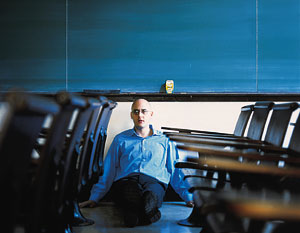
The following conversation between Colin Winnette (colinwinnette.com) and Ben Marcus (benmarcus.com) took place during the brutally mediocre winter of 2011. Both men carved a desk along with extra elbowroom into the walls of their unnecessary ice huts and began a steady email exchange. This was a final attempt to stay warmish. Listed below are the contents of that attempt. Special Thanks to Cassandra Troyan -The Eds.
Ben Marcus is the author of three books of fiction: Notable American Women, The Father Costume, and The Age of Wire and String. His new novel, The Flame Alphabet, will be published by Knopf in January of 2012. His stories, essays, and reviews have appeared in Harper’s, The Paris Review, The Believer, The New York Times, Salon, McSweeney’s, Time, Conjunctions, Nerve, Black Clock, Grand Street, Cabinet, Parkett, The Village Voice, Poetry, and BOMB. He is the editor of The Anchor Book of New American Short Stories, and for several years he was the fiction editor of Fence. He has recently served as the guest fiction editor for Guernica Magazine. He is a 2009 recipient of a grant for Innovative Literature from the Creative Capital Foundation. In 2008 he received the Morton Dauwen Zabel Award from the American Academy of Arts and Letters, and he has also received a Whiting Writers Award, a National Endowment for the Arts Fellowship in fiction, three Pushcart Prizes, and a fiction fellowship from the Howard Foundation of Brown University, where he taught for several years before joining the faculty at Columbia University’s School of the Arts.
*Portions of this interview first appeared in the Winter 2011 issue of the Tex Gallery Review
CW:Could you talk a little about your upcoming book, The Flame Alphabet? Its genesis and where things went from there?
BM: I’d been thinking for years about language as a toxic substance. Language itself making people sick. Speech and text, all of it poisonous. If you read a road sign you get nauseous. That was the original idea, but after Notable American Women I really didn’t want to write another heavily-conceptual, modular book. With that book, every new chapter felt like I was starting over. I wanted to write something continuous, a straight shot powered by one voice. I tried a lot of voices, forms, and approaches, and threw all of it away. But then I was doing some reading on underground Jewish cults and I found a pretty natural way to connect a language toxicity to a really personal narrative, even if that meant liberal falsifications and misreadings, and a story sort of bloomed fast out of that: a husband and wife who are sickened by the speech of their daughter. Literally. So sickened that they have to leave her. A situation so bad you’d have to abandon your child. This really frightened me, and I couldn’t even imagine it, which meant I had to chase it down. That was the opening premise, and once I had that I wrote the book in just over a year.
January 19th, 2011 / 1:06 pm
Your Books Broke My Neck
YOUR BOOKS BROKE MY NECK: A Physiosociative Review of Spork’s Chapbook Series # A – 4 (Jake Levine, Dan Beachy-Quick, Gordon Massman, Drew Krewer, Zachary Schomburg)
by Joe Hall and A Poem In A Remaindered Library Book
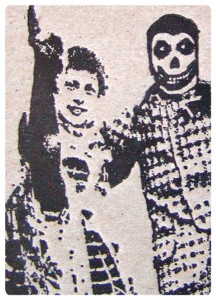 Dear mother…just now I am at the foot of a bone bridge. I shall be crossing it shortly. I don’t know if I shall find hills and valleys made of flesh on the other side, or simply constant night, villages of sleep. The seam of the open book on the bridge of my nose, two dense board covers pressing down the pages over my eyes on a bed in a basement dug into a planet. The spine of the book a roof peak for my face-house. Or a lid. It fits pretty good. I feel safe, take a nap. No, no, dummy, you are not designed to hurt me; I am designed to hurt you…Prominent stencils I remember in DC: some gorilla head, the Borf face (his dead friend?), like targets on specific lamp posts in Georgetown—as if the graffiti artists want you to remember there used to be punk shows there. And on Jake Levine’s (Chap A) cover—the black ink pressed into the brown paper board. Some kind of guy in a flannel suit with a smiling skull mask holding one foot up at head level? As if I’ve seen it through a metro window on some concrete barrier in Northeast?
Dear mother…just now I am at the foot of a bone bridge. I shall be crossing it shortly. I don’t know if I shall find hills and valleys made of flesh on the other side, or simply constant night, villages of sleep. The seam of the open book on the bridge of my nose, two dense board covers pressing down the pages over my eyes on a bed in a basement dug into a planet. The spine of the book a roof peak for my face-house. Or a lid. It fits pretty good. I feel safe, take a nap. No, no, dummy, you are not designed to hurt me; I am designed to hurt you…Prominent stencils I remember in DC: some gorilla head, the Borf face (his dead friend?), like targets on specific lamp posts in Georgetown—as if the graffiti artists want you to remember there used to be punk shows there. And on Jake Levine’s (Chap A) cover—the black ink pressed into the brown paper board. Some kind of guy in a flannel suit with a smiling skull mask holding one foot up at head level? As if I’ve seen it through a metro window on some concrete barrier in Northeast?
January 18th, 2011 / 1:01 pm
Breece’s Bones
This past Thanksgiving break, I rented a car to drive home to West Virginia and see my family. Also, I was supposed to meet up with Scott McClanahan (author of Stories I and Stories II), talk about his manuscript, and then go try and visit the grave of Breece D’J Pancake with him. It was the promise of this bonehunt that got me to walk to the rental car place, to rent that car, and to play all of that music so loudly and for so long in the car to get home to. Not that I didn’t want to see my family. It’s a long story. There is a shorter story.
Scott drove into Charleston from Beckley, stopping by my aunt’s house to meet up. We talked about his book for a bit, then got in my rental car to head off to find Breece. His grave was thirty minutes outside of Charleston in a town called Milton. How romantic were we being? Borderline-fucking-gay romantic is how romantic we were being, but Scott and I don’t care because we’re from here. This is our place as much as it is Breece’s. Not like we were going into some foreign land to find his grave, or disturbing his home. The state of West Virginia is our backyard river rope-swing too.
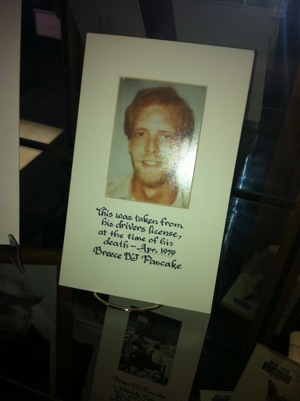
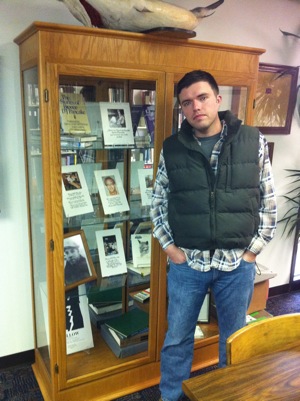
Weird Lens of the Unconscious: An Interview with Brian Conn
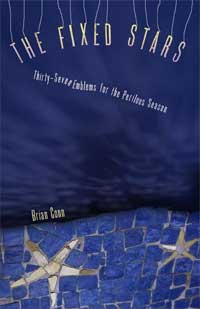 Brian Conn’s novel The Fixed Stars is a braid or a maze of fragments that together create an apocalypse, or an illusion thereof. It operates in turns as horror novel, as dystopia, as utopia, as Star Trek/Shakespeare pastiche, and also other modes, with language at once rock hard and dream-logicked. It was one of the most beautiful, challenging books published in 2010, and it didn’t get the attention it deserved. You should really and actually buy it. He is also the co-editor, with Joanna Ruocco, of Birkensnake, one of the more adventurous and interesting-to-touch journals available online and in print.
Brian Conn’s novel The Fixed Stars is a braid or a maze of fragments that together create an apocalypse, or an illusion thereof. It operates in turns as horror novel, as dystopia, as utopia, as Star Trek/Shakespeare pastiche, and also other modes, with language at once rock hard and dream-logicked. It was one of the most beautiful, challenging books published in 2010, and it didn’t get the attention it deserved. You should really and actually buy it. He is also the co-editor, with Joanna Ruocco, of Birkensnake, one of the more adventurous and interesting-to-touch journals available online and in print.
Brian was kind enough to talk with me at length about the ways we sort fiction, how he perceives character and voice, and other things.
* * *
MM: You wrote, in a blog comment I can no longer find, that you feel many of the major stories now seen as “literary” or “mainstream” and often offered as examples in creative writing classes, were actually very experimental works that created their own genre, and that these have only been elevated to/claimed as official literary works after the fact. I think you were responding to a post about The Things They Carried at the time, which I see as a good example. Another one that I might suggest would be Kafka’s The Metamorphosis, which hasn’t been as tamed and integrated as The Things They Carried, but is often offered as a model or set of rules of how certain stories ought to be written. His story “In the Penal Colony” also spawned a sort of mini-genre, I think, but it’s a weirder story and so it hasn’t really gotten the same treatment. Have I butchered your argument or would you like to further refine it? Do other examples come to mind?
BC: I do remember saying that at some point, and also forget where. The examples you mention are good ones, but it actually seems to me that literally every great (whatever that means) story is radically experimental in its own way. Last week I reread “The Dead,” which I usually think of as pretty straight, but even that gets bizarre once you start looking at it — for example the way various characters’ voices are continuously fading subtly in and out, so that even though there appears to be an omniscient narrator it’s hard to find a single line that’s purely in that narrator’s voice, and instead the whole narrative is sort of floating on this shifting sea of character voices.
I mean, what is a canonical “normal” story today? Hemingway? “A Good Man is Hard to Find”? But those are totally weird, right? “The Lottery”?
